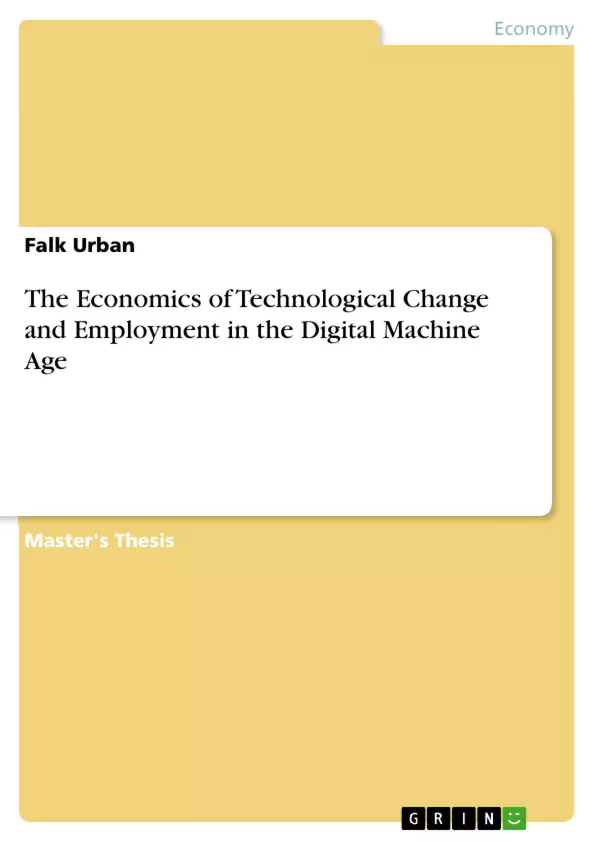Technology as a Matter of Economic Interest A timeliness object of discussion since the first noteworthy appearance of economic literature has always been the construct of technological unemployment. The fear of people being put out of work by some machines really took off during the industrial revolution in the late 18th century owed to the invention of the steam machine, which eventually lead to the automation of the weaving craft. The economic interest in the relationship between new technology and its social impact is mostly based on the idea of increased productivity. If we consider a production function containing an arbitrary number of input factors, then given a certain amount of output, profits will decrease, if any of those inputs is becoming more expensive. In the course of time before human and property rights were installed, this have been most often the factors land and labor. Labor insofar, as it depended massively on the ability of keeping people healthy and well-nourished and also on the expected life span which was certainly lower, centuries ago. The United Kingdom was affected first and severest by the invention of the steam-engine. Ulrike Herrmann (2013) explains the necessity of this invention on the scarcity of labor due to the wars and famines plaguing the Europe of that era. This disruptive general purpose technology is the first encounter of employees with massive technological unemployment and the almost obliteration of certain professions, i. e. weavers.
Inhaltsverzeichnis (Table of Contents)
- Introduction
- The Economic History of Technological Change
- From Industrial Revolution to Automation
- From Automation to Digitization
- The Neoclassical Theory of Technological Change and Employment
- Types and Drivers of Innovation
- Compensation Theory of Labor-Saving Technological Change
- Labor-Saving Technological Change
- A Neoclassical Model of Technological Change and Employment
- Estimating the Impact of Technological Change on Employment Measures
- Description of the Model
- Building the Model
- Estimation Results
- Conclusion
Zielsetzung und Themenschwerpunkte (Objectives and Key Themes)
This thesis aims to provide a comprehensive overview of the concept of technology in economics, with a particular focus on the impact of technological change on employment, drawing upon neoclassical views. It examines the idea of embodied technical change in new machinery and analyzes its relationship to employment trends in German manufacturing.
- The economic history of technological change and its impact on employment.
- Neoclassical theories of technological change and their explanations for employment effects.
- The role of embodied technical change in new machinery in driving employment dynamics.
- An empirical analysis of the relationship between technological change and employment measures in German manufacturing.
- The implications of technological change for the future of work and the global economy.
Zusammenfassung der Kapitel (Chapter Summaries)
Chapter 2 provides a historical overview of technological change, from the Industrial Revolution to the digital machine age. It examines how technological advancements have impacted labor markets, wages, and the overall economic landscape. It also discusses the emergence of skill-biased technological change and its potential implications for wage inequality.
Chapter 3 delves into the neoclassical theory of technological change, outlining its core concepts and how it explains the interaction between technology, productivity, and employment. It explores various compensation mechanisms that are proposed to mitigate potential negative employment effects of technological progress.
Chapter 4 focuses on the empirical analysis of the impact of technological change on employment measures in German manufacturing. Using a vintage-capital approach, the analysis examines the relationship between capital stock, productivity, and employment indicators over a period of two decades. It investigates whether the observed changes in employment can be attributed to technological advancements.
Schlüsselwörter (Keywords)
Technological change, employment, automation, digitization, neoclassical economics, compensation mechanisms, embodied technical change, vintage-capital approach, German manufacturing, labor productivity, capital stock, capacity utilization, industry 4.0.
Frequently Asked Questions
What is technological unemployment?
It refers to the loss of jobs caused by technological change, such as the introduction of steam engines in the 18th century or modern automation.
How does Neoclassical theory explain the impact of technology on labor?
It examines the interaction between technology, productivity, and employment, often focusing on "compensation mechanisms" that mitigate job losses.
What is the "Compensation Theory"?
The idea that labor-saving innovations eventually create new jobs through lower prices, increased demand, and new investment elsewhere in the economy.
What is embodied technical change?
It is the concept that technological progress is "built into" new capital equipment and machinery, requiring investment to realize productivity gains.
How has digitization affected German manufacturing?
The thesis analyzes employment dynamics in the German manufacturing sector using a vintage-capital approach to estimate the impact of modern automation.
- Quote paper
- Falk Urban (Author), 2015, The Economics of Technological Change and Employment in the Digital Machine Age, Munich, GRIN Verlag, https://www.grin.com/document/312623



